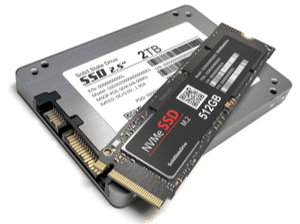Servers and SSD Performance
In the fast-evolving landscape of IT, where professionals are constantly seeking ways to overcome performance bottlenecks, attain faster application load times, and even achieve faster boot times, the use of flash memory, specifically solid state drives (SSD), has become a prevalent solution for maximizing server performance.
Solid state drives are widely acknowledged for their superior speed, efficiency, and reliability when compared to traditional hard disk drives. High-end SSDs, in particular, showcase remarkable read times, often exceeding double the speed of a typical SATA hard disk drive.
However, the challenge lies in the fact that while SSDs start off exceptionally fast, they tend to experience a decline in speed over time. Furthermore, SSD lifespan declines when write activity is increased.

Maintaining SSD Performance As Fast As New
When it comes to read performance, SSDs outpace standard hard drives significantly. This is primarily attributed to the absence of “seek time” that a traditional hard drive incurs when locating and retrieving data. Unlike hard drives, SSDs utilize an electrical pulse to read data, resulting in a considerably faster process.
However…
Contrary to a common misconception that SSDs, devoid of moving parts, are immune to file fragmentation, the truth is that these drives encounter write speed degradation due to fragmented file write activity and free space fragmentation.
SSD Write Performance
The process of writing data to an SSD presents a distinct challenge. Small free spaces are scattered throughout an SSD volume at the logical level and cause the file system to write a file in fragments to those small free spaces. By doing so, write performance is degraded by as much as 80% to that solid-state storage device.
Additionally, SSDs have a finite number of writes they can perform over their lifespan. Unlike hard drives that can write over old data, SSDs require old data to be erased before new data is written. Due to the doubling effect of needing to read and erase before it can write again, SSDs undergo twice as much use. This doubles the wear and tear and can cause major issues, including shortened lifespan, and slower random write performance. For more technical details, Do SSDs Degrade Over Time?
As an SSD nears its limit, increased fragmentation and write errors occur, resulting in performance slowdowns. Write performance decreases proportionately as free space fragmentation increases. All SSDs will suffer from this problem at one point or another unless DymaxIO® is used to optimize the solid-state drive.
DymaxIO’s IntelliWrite® Technology Restores SSD Write Performance
DymaxIO introduces IntelliWrite, a patented write optimization technology designed to automatically prevent excessively small, fractured, random writes and reads that compromise SSD performance. By enforcing contiguous and sequential writes, IntelliWrite ensures faster and more efficient operations compared to fragmented or random writes. The integration of IntelliWrite into the new DymaxIO fast data performance software guarantees optimal SSD performance, preventing the dreaded performance degradation.
Find The Right Solution For Your Server Performance Challenge
We provide solutions for over 90% of fortune 500 companies and are dedicated to finding the right solution to remedy your Windows Server performance challenge too. Select your area of concern below.
What People are Saying
What People are Saying
“Typically, IT professionals respond to application performance issues by reactively buying more hardware. Without the luxury of a padded budget, we needed to find a way to improve performance on the hardware infrastructure we already have. It saved us from having to make a heavy investment in SSDs or do a complete rip and replace of our entire hardware infrastructure. To this day, I still can’t believe software is doing this.”
R. Ortiz, IT Manager, ASL Marketing
“I have used Diskeeper since it was first introduced. It has always worked well in keeping my drive defragged for the fastest response times for all of my apps. Thank you again for this fine piece of software.”
Philip Baldwin, NVQB
“The Undelete software that we use on all our Regional Servers is undoubtedly worth every penny. It
has saved our Techs numerous hours in restoring files inadvertently deleted as opposed to having to
restore from backup tape.”
Michael Lucas, Gancom (Division of Gannet Fleming)
“Undelete saves backup restores when someone accidentally deletes a file from a Windows share. We store tapes off site so Undelete can save a big delay for file restores of that type. Undelete does what it says on the box – really – and it works nicely as a network recycle bin.”
Glenn Edwards, Infrastructure Analyst, Itron
“I have been using Diskeeper for many years, it is installed as a routine on all servers, networked clients, SHO and any other computer. It has never presented any problem and has always demonstrated improved drive performance in both servers and clients. With each new release Condusiv does not merely provide “window dressing”, they actually improve the product with the objective of making it easier to use, more reliable, more effective and easier to use.”
Mark Sills, Systems Administrator / Manager, Home User
